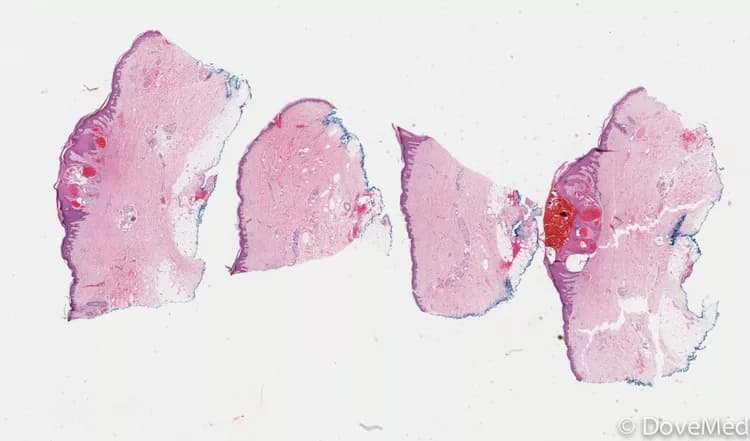What are the other Names for this Condition? (Also known as/Synonyms)
- Angiokeratoma of Fordyce (affecting Scrotum)
- Angiokeratoma of Mibelli (affecting Scrotum)
- Scrotal Angiokeratoma
What is Angiokeratoma of Scrotum? (Definition/Background Information)
- Angiokeratoma of Scrotum is a benign condition that consists of 2-5 mm sized papules, typically purple in color, on the scrotum. They may bleed when subjected to trauma (such as by picking or squeezing them)
- Angiokeratoma of Scrotum is actually caused by a collection of blood vessels. There are no risk factors for the condition
- Angiokeratoma of Scrotum may be diagnosed through physical examination, medical history evaluation, and confirmed through a tissue biopsy
- Treatment may be required for Angiokeratoma of Scrotum, if it causes cosmetic concerns or get infected. In such cases, electrosurgery or laser vaporization may be performed
- The prognosis of Angiokeratoma of Scrotum is excellent with suitable treatment such as surgery or laser therapy
Who gets Angiokeratoma of Scrotum? (Age and Sex Distribution)
- Angiokeratoma of Scrotum is a common, benign condition that affects both boys and men (all age groups); the risk increases with increasing age
- It is mostly seen in men over 40 years. In general, angiokeratomas affect males more than females
- The condition can occur worldwide and no geographical preference is seen
- Individuals of all racial and ethnic background may be affected, though for some reason, it is reported more in Caucasians than African Americans
What are the Risk Factors for Angiokeratoma of Scrotum? (Predisposing Factors)
- The risk factors for Angiokeratoma of Scrotum are largely unknown
- However, the condition may develop post-radiation to the genital region
- A family history of Angiokeratomas of the Scrotum is a risk factor
It is important to note that having a risk factor does not mean that one will get the condition. A risk factor increases ones chances of getting a condition compared to an individual without the risk factors. Some risk factors are more important than others.
Also, not having a risk factor does not mean that an individual will not get the condition. It is always important to discuss the effect of risk factors with your healthcare provider.
What are the Causes of Angiokeratoma of Scrotum? (Etiology)
- The exact cause of development of Angiokeratoma of Scrotum is unknown
- The condition is not contagious and does not spread from one individual to another
What are the Signs and Symptoms of Angiokeratoma of Scrotum?
The signs and symptoms of Angiokeratoma of Scrotum may include:
- Presence of small, single or multiple papules that are normally purple in color, on the scrotum
- The lesions may bleed when subjected to pressure or trauma (when squeezed or scratched), which can lead to an infection
- The skin over the papules may be thickened. Sometimes, the skin over the papules may get infected with bacteria or fungus
- Such bacterial infections can cause pus to drain and the lesion to become painful, resulting in severe infection
How is Angiokeratoma of Scrotum Diagnosed?
The following are the diagnostic methods to help identify Angiokeratoma of Scrotum:
- A thorough physical examination and a complete medical history are very crucial
- Dermoscopy: Dermoscopy is a diagnostic tool where a dermatologist examines the skin using a special magnified lens
- A biopsy of the papule is usually necessary to confirm the diagnosis. A pathologist examines the biopsy under a microscope. After putting together clinical findings, special studies on tissues (if needed) and with microscope findings, the pathologist arrives at a definitive diagnosis
Many clinical conditions may have similar signs and symptoms. Your healthcare provider may perform additional tests to rule out other clinical conditions to arrive at a definitive diagnosis.
What are the possible Complications of Angiokeratoma of Scrotum?
The complications due to Angiokeratoma of Scrotum may include:
- Severe infection necessitating surgical treatment
- Individuals may have stress and anxiety issues fearing that the condition is a sexually-transmitted infection
- Some individuals have cosmetic concerns due to the appearance of the papules
How is Angiokeratoma of Scrotum Treated?
In a majority of cases, no treatment is required for Angiokeratoma of Scrotum, since it is a benign condition. However, in some cases, the following treatment measures may be considered:
- Providing reassurance and helping with anxiety feelings, since the condition is harmless and has an excellent outcome
- Some individuals may consult healthcare professionals to rule out sexually-transmitted infections (if any)
- Individuals, in whom it causes cosmetic issues, may undergo surgical excision, electrosurgery, or laser therapy to have them removed
- In case of severe infection, complete surgical excision with skin grafting may be necessary
How can Angiokeratoma of Scrotum be Prevented?
Currently, there are no specific methods or guidelines to prevent Angiokeratoma of Scrotum.
What is the Prognosis of Angiokeratoma of Scrotum? (Outcomes/Resolutions)
Angiokeratoma of Scrotum is a common, benign (non-cancerous) condition that has an excellent prognosis with appropriate treatment.
Additional and Relevant Useful Information for Angiokeratoma of Scrotum:
- There are two forms of angiokeratoma - localized and generalized. The generalized form is also known as angiokeratoma corporis diffusum. It is usually present with metabolic disorders such as Fabry disease
- There is no evidence to prove that oily foods and chocolate-based products have an influence on Angiokeratoma of Scrotum
- The presence of dirt on the body is not a causative factor for the condition. However, it helps to be clean and hygienic, which may help the condition from getting worse
Related Articles
Test Your Knowledge
Asked by users
Related Centers
Related Specialties
Related Physicians
Related Procedures
Related Resources
Join DoveHubs
and connect with fellow professionals



0 Comments
Please log in to post a comment.